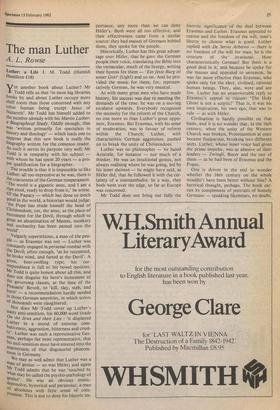The man Luther
A. L. Rowse
Luther: a Life J. M. Todd (Hamish Hamilton £18)
Yet another book about Luther? Mr Todd tells us that 'in most big libraries books by and about Luther occupy more shelf room than those concerned with any other human being except Jesus of Nazareth'. Mr Todd has himself added to the number already with his Martin Luther: a Biographical Study. Oddly enough, that was 'written primarily for specialists in history and theology' — which leads one to. suppose that this new book is really the biography written for the common reader. As such it serves its purpose very well; Mr Todd is in sympathy with his subject with whom he has spent 20 years — a pro- Per qualification for a biographer. The trouble is that it is impossible to like Luther: all too expressive as he was, there is the coarseness of the German temperament. 'The world is a gigantic anus, and I am a ripe stool, ready to drop from it,' he wrote. Of the Papacy — which has done so much good in the world, a historian would judge: the Pope has made himself the head of Christendom, yes, the anus, as the place of excrement for the Devil, through which so great an abomination of Masses, monkery and unchastity has been passed into the Vulgarly superstitious, a man of the peo- Pie — as Erasmus was not — Luther was constantly engaged in personal combat with the Devil; often enough, 'as he recounted, he broke wind, and farted at the Devil'. A gross, beer-swilling type, his cor- respondence is full of his bowel motions. Mr Todd is quite honest about all this, and does not disguise his hero's incitement of the governing classes, at the time of the Peasants' Revolt, to 'kill, slay, stab, and burn' — a recommendation hardly needed in those German amenities, in which scores of thousands were slaughtered. Nor does Mr Todd cover up Luther's nasty anti-semitism, his 60,000 word tirade On the Jews and their Lies : 'it displayed Luther in a mood of extreme corn- bativeness, aggression, bitterness and cruel- ty'• Luther was such a representative Ger- man, Perhaps the most representative, that his anti-semitism must have entered into the mainstream of that disgraceful phenom- enon in Germany. We may as well admit that Luther was a man of genius — so was Hitler; and again Mr Todd admits that he was 'touched by What may be called the psycho-pathology of enios'• He was an obvious manic- depressive, hysterical and paranoiac, a man of absolutes with little sense of com- promise. This is not to deny his historic im-
portance, any more than we can deny Hitler's. Both were all too effective, and their effectiveness came from a similar source: they had masses of Germans behind them, they spoke for the people.
Historically, Luther has this great advan- tage over Hitler, that he gave the German people their voice, translating the Bible into the vernacular, much of the liturgy, writing their hymns for them — `L'in feste Burg 1st unser Gott' (Ugh!) and so on. And he pro- vided the music for them, for, represen- tatively German, he was very musical.
As with many great men who have made history, his success was due to meeting the demands of the time: he was on a moving escalator upwards. Everybody recognised the necessity for the reform of the Church, no one more so than Luther's great oppo- nent, Erasmus. But Erasmus, with his sense of moderation, was in favour of reform within the Church; Luther, with characteristic German aggression, pushed on to break the unity of Christendom.
Luther was no philosopher — he hated Aristotle, for instance — nor much of a thinker. He was an intuitional genius, not always realising where he was going, led by his inner daitnon — he might have said, as Hitler did, that he followed it with the cer- tainty of a somnambulist. In a way, they both went over the edge, so far as Europe was concerned.
Mr Todd does not bring out fully the
historic significance of the duel between Erasmus and Luther. Erasmus appealed to reason and the freedom of the will, man's liberty to choose what is good. Luther replied with De Servo Arbitrio — there is no freedom of the will for man, he is the
creature of the - irrational. How characteristically German! But there is a good deal in it; and because he spoke for the masses and appealed to unreason, he was far more effective than Erasmus, who spoke only for the elect, civilised, rational human beings. They, alas, were and are few. Luther has an unanswerable reply to Erasmus's appeal to reason: 'The Holy Ghost is not a sceptic!' That is, it was his own inspiration, his own ego, that was to rule — as with Hitler.
Civilisation is hardly possible on that basis, and it is no wonder that, in the 16th century, when the unity of the Western Church was broken, Protestantism at once became fissiparous, breaking into different sects. Luther, whose inner voice had given the prime impulse, was as abusive of their leaders — Zwingli, Bucer and the rest of them — as he had been of Erasmus and the Popes.
One is driven in the end to wonder whether the 16th century on the whole wouldn't have been better without him? A heretical thought, perhaps. The book car- ries its complement of portraits of homely Germans — speaking likenesses, no doubt.










































 Previous page
Previous page